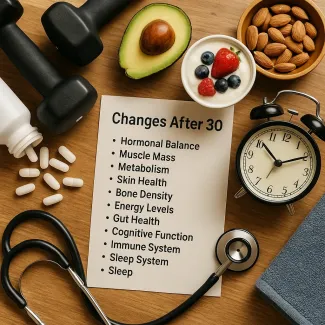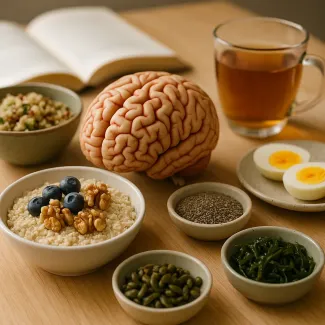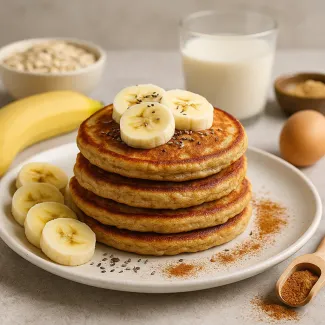
Build Lasting Energy and Strength in Your 30s
Smart daily choices to improve vitality, prevent burnout, and boost lifelong health
Why your 30s are a turning point for physical health
Entering your 30s marks a subtle yet important physiological shift. Metabolism begins to slow down, recovery times increase, and hormonal balance becomes more delicate. What once worked in your 20s — irregular sleep, high-carb meals, skipping workouts — may now lead to fatigue, weight gain, and mental fog. But this decade also provides a unique window: with the right daily habits, you can build resilience that protects your long-term health.
Establishing smart routines in your 30s doesn’t require extreme changes. It calls for consistency, self-awareness, and a willingness to adapt to your changing body. Every small choice — from your morning hydration to how you wind down in the evening — either supports or undermines your energy levels, mental clarity, and immune function.
Movement matters more than ever
Rethink your relationship with exercise
In your 30s, physical activity is less about aesthetics and more about energy, mobility, and metabolic health. Regular movement supports cardiovascular function, improves sleep, regulates hormones, and prevents muscle loss.
Minimum effective dose: what really works
- Strength training 2–3 times per week: Preserves lean muscle, increases resting metabolism, supports bone density.
- Daily walking or light cardio: A 30-minute brisk walk improves circulation, enhances brain function, and helps regulate blood sugar.
- Mobility and stretching: Essential for joint health and recovery. Include dynamic stretching in the morning and static stretches in the evening.
Prioritize recovery to avoid overtraining
- Rest days are essential, not optional.
- Use tools like foam rollers, Epsom salt baths, or active recovery days (e.g., gentle yoga or walking).
- Monitor signs of overtraining: persistent soreness, low energy, irritability, and trouble sleeping.
Eat to energize and repair
Fuel your 30s with smart nutrition
Nutrition in your 30s should focus on supporting energy, balancing hormones, and maintaining a healthy weight. You don’t need a restrictive diet — you need a balanced, whole-foods approach.
Key nutritional strategies for daily vitality
- Prioritize protein: Include high-quality protein at every meal to support muscle repair and satiety.
- Balance your plate: Fill half with vegetables, a quarter with lean protein, and a quarter with complex carbs.
- Healthy fats: Incorporate omega-3s (e.g., salmon, walnuts, flaxseeds) to support brain and hormonal health.
- Fiber-rich foods: Support digestion, blood sugar control, and microbiome health (e.g., oats, legumes, leafy greens).
Common nutritional mistakes in your 30s
- Skipping meals due to stress or time constraints.
- Over-relying on caffeine instead of addressing energy imbalances.
- Underestimating the impact of alcohol and processed snacks on hormonal and metabolic health.
Strengthen your gut, strengthen your immunity
Why gut health is a cornerstone of well-being
Your gut affects far more than digestion. It plays a critical role in immune function, mood regulation, and energy production. In your 30s, focusing on gut balance becomes essential for reducing inflammation and preventing chronic issues.
Daily gut-friendly practices
- Start your day with prebiotics: Bananas, garlic, leeks, and onions feed healthy gut bacteria.
- Add fermented foods: Yogurt, kefir, kimchi, and sauerkraut improve microbiome diversity.
- Stay hydrated: Adequate water intake helps move waste efficiently through your digestive system.
- Avoid overuse of antibiotics and unnecessary supplements that disrupt gut flora.
Mental sharpness and emotional resilience
Your brain needs care, too
Cognitive changes can begin subtly in your 30s. You may notice occasional brain fog, forgetfulness, or decreased focus. These can be signs of mental fatigue, often triggered by poor sleep, stress, or blood sugar fluctuations.
Support focus, clarity, and memory
- B vitamins and omega-3s: These nutrients are essential for brain energy and neurotransmitter function.
- Daily mental breaks: Step away from screens for 5–10 minutes every hour to reset mental energy.
- Mindful breathing: Reduce stress hormones and support mental clarity with 5 minutes of deep breathing.
- Sleep discipline: Lack of sleep is one of the fastest ways to impair cognitive function.
Hormonal harmony after 30
Restore balance through daily habits
Hormones regulate metabolism, mood, sleep, and weight. In your 30s, you may begin to feel subtle hormonal fluctuations — especially related to stress, cortisol, insulin, and sex hormones (estrogen, progesterone, testosterone).
Practical ways to stabilize hormones
- Avoid blood sugar spikes: Focus on meals rich in fiber and protein, and limit high-glycemic foods.
- Stress management: Chronic stress disrupts cortisol levels, which in turn affect sleep and fat storage.
- Consistent sleep-wake cycles: Go to bed and wake up at the same time, even on weekends.
- Moderate caffeine intake: Too much can increase anxiety and cortisol levels, affecting hormonal rhythm.
Sleep as a performance enhancer
Quality sleep is non-negotiable
Your ability to stay fit, focused, and emotionally balanced hinges on restorative sleep. Sleep is when your body heals, your brain detoxifies, and your hormones reset. In your 30s, sleep disruptions often increase due to work demands, young children, or screen exposure.
Create a sleep-supportive routine
- Wind-down rituals: Stretching, reading, journaling, or light music can signal your brain it’s time to rest.
- Limit screens after 9 PM: Blue light delays melatonin production and disrupts your circadian rhythm.
- Cool, dark bedroom: Ideal temperature is 16–19°C (60–67°F). Use blackout curtains or an eye mask.
- Consistent sleep window: Aim for 7.5–8.5 hours nightly, going to bed and waking up at the same time.
Reconnect with movement during the day
- Take sunlight breaks: Morning sun exposure helps regulate sleep-wake cycles and boosts mood.
- Avoid heavy meals before bed: Eat at least 2–3 hours before sleeping to reduce indigestion and sleep disturbance.
Energy management beats time management
Plan your day by energy zones
You likely already plan your day around time — but planning around your energy levels can increase productivity and reduce stress. This is especially helpful if you experience afternoon crashes or low motivation.
Align tasks with your body’s natural rhythm
- Morning (high focus): Use this time for demanding work, decision-making, or creative thinking.
- Midday (movement reset): Include a short walk or movement break to refresh circulation and focus.
- Afternoon (lower energy): Schedule less demanding tasks like email or admin work.
- Evening (recovery): Shift focus to rest, light meals, and family or social connection.
Build resilience through lifestyle synergy
Combine movement, mindset, and nourishment
The power of holistic health is in the synergy — when movement, nutrition, mindset, and recovery all align. Focusing on just one pillar will help, but combining them amplifies the benefits.
Habits that have a compounding effect
- Morning routines: Start with hydration, sunlight, light movement, and mindful intention.
- Batch food prep: Simplifies your week and ensures access to nourishing meals even when busy.
- Limit multitasking: Improves mental focus and lowers stress.
- Track your energy: A simple journal of mood, sleep, and food can reveal patterns to optimize.
Cultivate mental strength and self-awareness
- Practice gratitude: Just 2 minutes per day reduces stress and boosts emotional resilience.
- Limit digital clutter: Unsubscribe from noise. Focus on what fuels you.
- Connect offline: Strong social relationships are among the top predictors of longevity.
The role of supplements in your 30s
Support — not replace — healthy habits
While supplements aren’t a substitute for a nutritious diet, they can fill gaps — especially if your lifestyle is demanding or your diet lacks variety.
Key supplements to consider
- Vitamin D3: Especially if you live in a low-sunlight region or spend most time indoors.
- Magnesium: Supports relaxation, sleep, muscle recovery, and blood sugar control.
- Omega-3s: Reduce inflammation, support heart health, and improve mood.
- Probiotics: Help restore gut balance, particularly after illness or antibiotic use.
Know what to avoid
- Avoid mega-doses unless prescribed. More isn’t always better.
- Skip trendy supplements not backed by science. Focus on what your body actually needs.
Hydration as a daily performance tool
Water affects everything from energy to immunity
Dehydration is a silent energy thief. Even mild fluid loss can affect your mood, focus, and digestion.
Smart hydration strategies
- Start your day with 500 ml (2 cups) of water to kickstart metabolism.
- Add electrolytes if you sweat a lot or drink caffeine regularly.
- Use a reusable bottle to track daily intake.
- Flavor water naturally with citrus, mint, or cucumber for variety.
Building routines that last
Anchor your health in consistent micro-habits
Long-term fitness and health don’t come from occasional bursts of motivation. They come from daily behaviors so simple and consistent that they become second nature.
Examples of micro-habits
- 2-minute stretch after waking
- Standing up every 45 minutes
- Putting your phone away during meals
- Sleeping with your phone in another room
- Meal prepping on Sundays
- Drinking water before coffee
When these small actions become automated, they require less willpower — and their cumulative impact becomes visible in your energy, focus, mood, and physical health.
Staying fit isn’t about perfection
It’s about paying attention to your body, honoring its needs, and choosing to show up — even when motivation fades. In your 30s, consistency wins over intensity. With time, your body will thank you with strength, clarity, and vibrant longevity.





